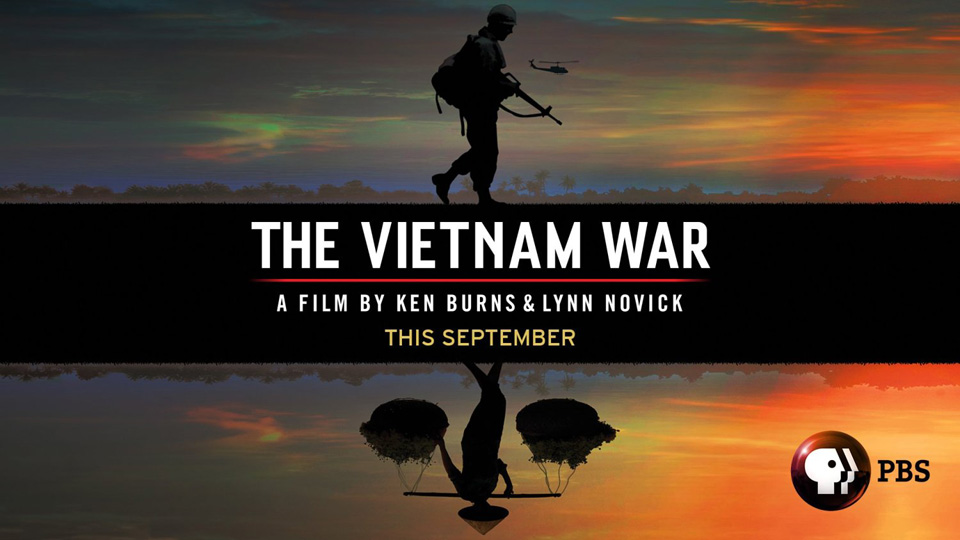
Ask the average American how many people were killed during the Vietnam War and the answer, charitably assuming they know anything about the war at all, will probably be “around 58,000.” Accurate as it goes, since that’s roughly the number of Americans who fell in Southeast Asia between 1964 and 1975. Alas, it fails to consider the 3 to 5 million Vietnamese, Laotians and Cambodians who also died, many of them victims of American weapons of mass destruction: the napalm, Agent Orange, forest and crop defoliants, and carpet bombing that indiscriminately obliterated civilians in a frenzied pursuit of the People’s Army of Vietnam (NVA) and Viet Cong.
Because let’s be honest: For most Americans, it’s the 58,000 names on that memorial wall in Washington, D.C., that count. Anything (and anyone) else is an afterthought, or irrelevant.
It was to broaden that narrow thinking, we are told, that at least in part inspired the documentarians Ken Burns and Lynn Novick to spend a decade working on “The Vietnam War,” the 10-part, 18-hour tour de force that aired recently on PBS (and can still be seen by going to pbs.org). The idea was a retelling of what the Vietnamese call the American War, this time from both sides of the conflict.
To do that, Burns and Novick lined up veterans, civilians, agents and spies from every point on the compass. As a chronicle of the human drama, it works. So long as a soldier is recounting his dread of battle or a dead comrade, or a mother is mourning the loss of her son, the stories hit home, helped along by terrific editing and evocative background music, including an endless supply of ’60s rock anthems. As a piece of filmmaking, it’s often brilliant.
But watching “The Vietnam War” from a Communist perspective (or even a neutral historian’s perspective), as I did, was hardly inspiring. It looked like the same-old, same-old to me. More subtle, certainly, than the blatant, we-were-the-good-guys-and-they-weren’t propaganda we’ve swallowed for years, but in the end an apologia nevertheless for America’s dangerous Cold War mindset and arrogant empire building.
In the world according to Burns, it was poor America, the blundering but well-meaning giant, freedom’s protector, stumbling into a war in a faraway place nobody in the States had ever heard of (excepting, of course, everybody in the CIA, the Joint Chiefs, the underlings in the Pentagon, and the president). But somebody had to keep those dominoes from toppling, damn it!
As history, “The Vietnam War” is a failure, although I imagine it achieved what Burns and Novick set out to achieve. The final French years and the subsequent decision by Eisenhower to intervene after the battle of Dien Bien Phu where the French were defeated, are covered with broad brushstrokes at best. While mention is made of South Vietnam’s Ngo Dinh Diem squashing an agreed-upon democratic national election in 1956, left unsaid is that he blocked it with U.S. connivance. Eisenhower later admitted that had the election been held, Ho Chi Minh would have won in a landslide.
In other words, the country would have been unified as it finally was in 1975, but twenty years earlier and without the deaths of millions.
The coverage of other political aspects also leaves a lot to be desired. Setting aside the “yes, but…” excuses for every U.S. president from Ike to Ford (although Nixon and his pit bull Kissinger get it pretty hard), I was perplexed at the heavy-handed treatment of Le Duan, head of the Communist Party of Vietnam and the leading architect of the Vietnamese war effort. The guy was no cupcake but by his portrayal you would have thought he was Hitler rolling into Poland. The Vietnam War was first and foremost a civil war and he was fighting it on those terms. Against an enemy being supported by the most technically advanced army and military arsenal on Earth, by the way.
As for the actual fighting, Burns and Novick do a good job, helped along by some remarkable combat footage, of illustrating the futility and hopelessness of the front-line soldier. Of course, you’d expect no less from an American filmmaker, considering the many opportunities that exist to see the U.S. soldier at war.
There was no way to gloss over the American atrocities committed in Vietnam since there were so, so many, but except for one soldier’s sorrowful recollection of a gang rape and the massacre of civilians at My Lai (made to seem like an isolated war crime rather than an all-too-common occurrence), the filmmakers did their best to soft-pedal the bad stuff and keep the boys as innocent as possible. And somehow, no matter what, the North’s atrocities always seemed a little bit worse, which, on the face of it, is pure bullshit. The U.S. used everything short of nuclear weapons to butcher people promiscuously, destroying cities, infrastructure, and countryside, north and south.
The antiwar movement in the U.S. is generally cast in a poor light, too, although cops still look bad beating kids with billy clubs. But again, skillful editing saves the day for our all-American team, with footage of heroic soldiers bleeding and dying on a forlorn hill interspersed with images of stoned hippies dancing braless in the Haight-Ashbury, oblivious to everything but their own pleasure.
Somewhere in there is narrator Peter Coyote, making what I thought was one of the more remarkable statements in the series, saying that the protestors seemed more upset by the civilian casualties of the American bombings than they did by the rough treatment meted out to U.S. pilots shot down and captured while making those bombing runs. Well, duh!
While Coyote’s laconic narration generally works, I couldn’t help but notice how his inflection grows more brittle when talking about North Vietnamese politics and strategy. He seems to have an especially hard time saying the word “Communist” without clenching his teeth.
That all will not go well on the neutral storytelling front is apparent before the first Frenchman falls at Dien Bien Phu. Each episode opens with the standard PBS nod to the various sponsors, both individuals and foundations, “that made this program possible.” The usual, well-heeled suspects are out in force—the Lavines, the Pews, the Mellons, the Vining Davises—but David H. Koch is there too. Right. That one. And topping it off is a treacly commercial from Bank of America, dripping with insincerity on a background of cello music, numbing us with weasel words about supporting public discourse as an integral part of a connected society. Remember that, the next time the banks need a bailout.
With sponsors like these, Uncle Ho and Le Duan never had a chance.
As a human story, it’s hard not to have sympathy for the majority of the people in this documentary, regardless of ideology, theirs or yours. War makes everybody a victim eventually, and on that basis this is worth the viewing. Just watch the drinking and steer clear of sharp objects while the film is in progress.
Tony Long is a comrade in the Harry Bridges (San Francisco) branch of CPUSA. He’s old enough to have gone, but he didn’t.












Comments